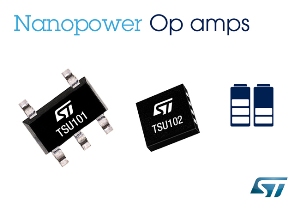Oct 15 2013
STMicroelectronics’ TSU10X nanopower op-amps, which are part of the ST micropower op-amp family, provide ultra-low power consumption over the full operating temperature range, allowing engineers to optimize power budget and battery lifetime wherever quiescent current is the major concern.

The TSU101, TSU102 and TSU104 are single, dual and quad configurations, respectively. Drawing less current per op-amp than the typical self-discharge current of a lithium-ion battery, TSU10x devices enable longer operation from small coin cells in applications such as energy-harvesting systems, personal medical monitors, smoke alarms, passive infrared detectors, wireless sensors, security cameras and smart tags.
Specified maximum current over the temperature range is as low as 800nA at 1.8V or 850nA at 3.3V and typical current consumption is just 580nA at 25°C and 1.8V. The maximum input offset voltage is 4.5mV and input bias current is 300pA, also specified over the full temperature range. The devices have rail-to-rail inputs and outputs, operate from 1.5V to 5.5V, and have typical gain-bandwidth product of 8kHz.
Joining ST’s TS88x series of nanopower comparators, the TSU10x devices are available immediately, in SC70, SOT23-5, DFN8 2x2, MiniSO8, QFN16 3x3 or TSSOP14 packages depending on configuration. Prices start from $0.50 for 1,000 units.
For further information please go to https://www.st.com/content/st_com/en.html